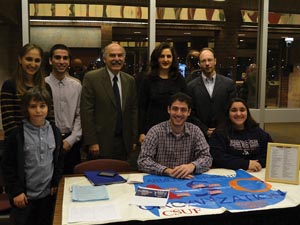Tamar Karkazian
Editor

Starting in January of this year, students in the Armenian Studies Program have had the opportunity to take a class from Dr. Sona Haroutyunian (Professor of Armenian Studies, University of Venice). But on February 25, the opportunity was expanded to the wider community, as Dr. Haroutyunian, the 10th Kazan Visiting Professor of Armenian Studies, presented a lecture on “Armenian Genocide in Literature,” the first of three lectures on “The Theme of the Armenian Genocide in Literature, Translation, and Cinema.”
The focus of Dr. Haroutyunian’s presentation was Skylark Farm, the well-known novel of Italian-Armenian writer, Antonia Arslan. Skylark Farm served as an example of how accounts from the Armenian Genocide are passed down and shared with the world. Stories of survival, usually combine various genres, such as fiction, history and biography, to create a sort of historical fiction. That is precisely how the award-winning book was composed, based on accounts from Arslan’s grandfather’s survival, passed down through generations.
Dr. Haroutyunian went on to explain that “there are several stages before a historical event, such as the Armenian Genocide, penetrates into literature. First comes the historical event. What then follows is the translation of that event in the minds of the survivors, i.e., their memory and interpretation of the event. Then, memory becomes the subject of oral history, making intergenerational transmission possible. The oral history comes into the minds of the writers of memoir and fiction, and finally, to the filmmaker, if such a story makes it to this step, who then translates the text in order to render the film as she or he has interpreted the story.”
These types of contributions are important because it draws more attention to the Armenian Genocide. The first quote in the book, “Uncle Sempad is only a legend for us—but a legend that made us cry” exemplifies the importance of the literary genre to recognizing the events of the Armenian Genocide, because it shows how there is a sad truth that has not been completely revealed. Dr. Haroutyunian continued to share why most literature about the Armenian Genocide is still important as it “raises awareness about the unknown or the forgotten.”
Along with leaving the audience with a better understanding of the impact of the genocide narrative, audience members also left with a newfound appreciation and respect to the country of Italy and for its support of the Armenian people and country. At the end of Dr. Haroutyunian’s presentation, Dr. La Porta thanking the speaker for her enlightening talk, added some facts detailing the support Italy had for Armenia. One such testament was the way Italy tried to help during the Genocide. The Prime Minister fought to stop the Genocide, and created colonies after the war for Armenians to migrate to.
Dr. Haroutyunian will continue the series of lectures with a talk on “Armenian Genocide in Translation,” at 7:30PM on Thursday, March 14, in the University Business Center, Peters Auditorium.
 Hye Sharzhoom Armenian Action
Hye Sharzhoom Armenian Action